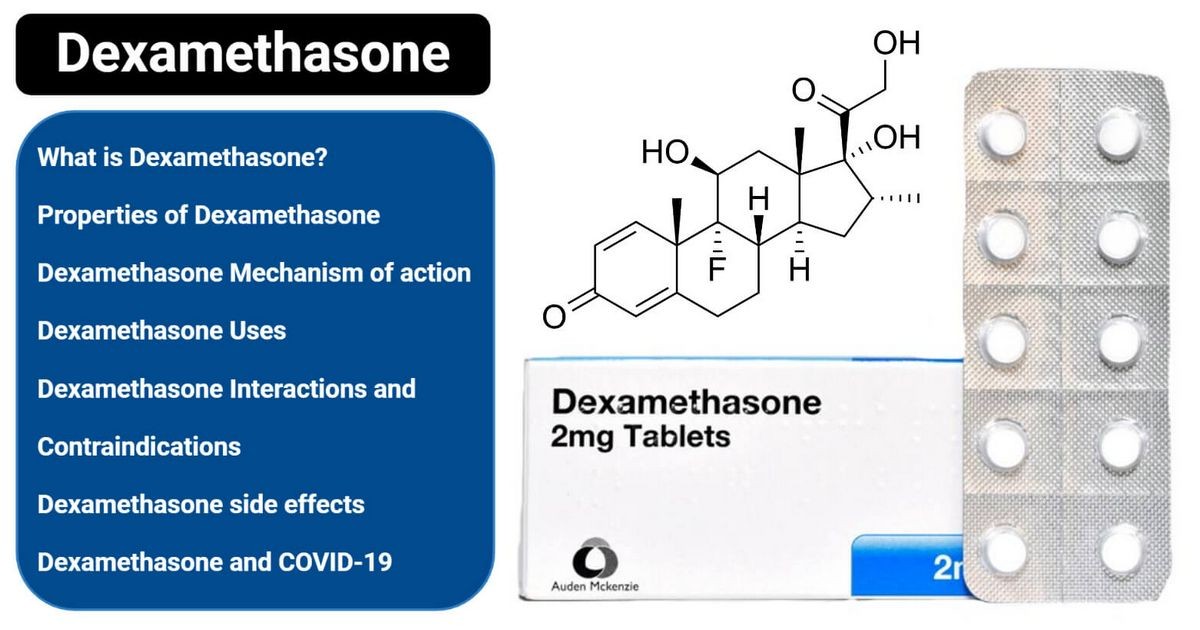
Contents
dexamethasone (Decadron, DexPak) Uses
Dexamethasone is a synthetic corticosteroid. Corticosteroids are chemicals produced by the adrenal glands. They affect many cells in the body and suppress the immune system. Corticosteroids also block inflammation and are used in inflammatory diseases affecting organs. The FDA approved dexamethasone in October 1958.
Brand names and generic drug
Uses for dexamethasone?
A UK study of 7,000 patients made dexamethasone the standard for severe COVID-19 patients. It can save the life of one in eight ventilated patients and one in 25 patients on oxygen, according to Medscape.
Dexamethasone is used for reducing inflammation in many conditions. Examples include:
- rheumatoid arthritis,
- systemic lupus,
- acute gouty arthritis,
- psoriatic arthritis,
- ulcerative colitis, and
- Crohn’s disease.
Severe allergic conditions that fail to respond to other treatments may respond to dexamethasone. Examples include:
- bronchial asthma,
- allergic rhinitis,
- drug-induced dermatitis, and
- contact and atopic dermatitis.
Chronic skin conditions treated with dexamethasone include:
- dermatitis herpetiformis,
- pemphigus,
- severe psoriasis, and
- severe seborrheic dermatitis.
Dexamethasone is used in the treatment of cancers of the white blood cells (leukemias), and lymph gland cancers (lymphomas). Blood diseases involving destruction by the body’s own immune system of platelets are also treated with dexamethasone, disease like idiopathic thrombocytopenic purpura, and red blood cells (autoimmune hemolytic anemia. Other miscellaneous conditions treated with dexamethasone include thyroiditis and sarcoidosis.
Dexamethasone is used as replacement therapy in patients unable to produce sufficient corticosteroids.
Many medical problems treated by this drug are "off label"; its use is not approved by the FDA.
Side effects
Side effects of dexamethasone depend on the dose, duration, and frequency of administration. Short courses are usually well tolerated with few and mild side effects. Long term, high dose dexamethasone can produce serious side effects. The lowest effective dose should be used for the shortest time to minimize side effects. Alternate day dosing can also reduce side effects.
Side effects include:
- fluid retention,
- weight gain,
- high blood pressure,
- loss of potassium,
- increase in serum glucose levels (especially in diabetics),
- headache,
- muscle weakness,
- puffiness of and hair growth on the face,
- thinning and easy bruising of the skin,
- glaucoma,
- cataracts,
- peptic ulceration,
- worsening of diabetes,
Other side effects include:
- irregular menses,
- growth retardation in children,
- convulsions, and
- psychic disturbances.
Psychic disturbances include:
- depression,
- euphoria,
- insomnia,
- mood swings,
- personality changes, and
- psychotic behavior.
Prolonged use of dexamethasone can depress the body’s ability to produce corticosteroids. Abruptly stopping dexamethasone can cause symptoms of corticosteroid insufficiency, with nausea, vomiting, and shock. Therefore, withdrawal is usually done by gradually reducing the dose.
Dexamethasone and other corticosteroids can mask signs of infection and impair the body’s immune response against infection. Patients on corticosteroids are more susceptible to infections and can develop more serious infections than individuals not receiving corticosteroids. For example, chickenpox and measles viruses can produce serious illnesses in patients on high doses of dexamethasone. Live virus vaccines, such as the smallpox vaccine, should be avoided, as even vaccine viruses may cause disease in these patients. Some infectious diseases, such as tuberculosis (TB) and malaria, can reactivate in a patient undergoing corticosteroid treatment.
By interfering with the immune response, dexamethasone can impede the effectiveness of vaccinations. Dexamethasone can interfere with the tuberculin (TB) skin test and cause falsely negative results in patients with dormant tuberculosis infection.
Dexamethasone impairs calcium absorption and new bone formation, increasing the risk of osteoporosis and fractures. Supplemental calcium and vitamin D are encouraged. Bisphosphonate drugs like alendronate (Fosamax) can prevent bone loss.
In rare cases, large joint destruction can occur during dexamethasone treatment, causing severe joint pain and requiring joint replacements.
Dosage
Dosage requirements vary among individuals and diseases. The lowest effective dose is used. The initial oral dose is 0.75 mg to 9 mg daily, adjusted based on response. Corticosteroids given multiple times daily are more effective but also more toxic than the same total daily dose given once daily or every other day.
Drug interactions
Corticosteroids may increase or decrease the effect of blood thinners like warfarin. Blood clotting should be monitored and the dose adjusted when patients receiving blood thinners start corticosteroid treatment.
Phenobarbital, ephedrine, phenytoin (Dilantin), and rifampin (Rifadin, Rimactane) may increase the breakdown of corticosteroids by the liver, resulting in lower blood levels and reduced effects. The dose may need to be increased if treatment with any of these agents is begun.
There may be unknown mechanisms through which mifepristone reduces the action of corticosteroids. Dexamethasone may decrease blood levels of mifepristone. The two should not be combined.


